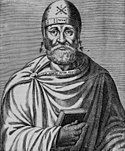Philo of Alexandria Quote
The Illusory SelfI am composed of body and soul, I seem to have mind, reason, sense, yet I find none of them my own. For where was my body prior to my birth, and whither will it go when I have departed? Where are the various states produced by the life stages of an illusory self? Where is the newborn babe, the child, the boy, the pubescent, the stripling, the bearded youth, the lad, the full-grown man? Whence came the soul, whither will it go, how long will it be our mate? Can we tell its essential nature? When did we acquire it? Prior to our birth? But we were not then in existence. What of it after death? But then we who are embodied, compounds endowed with quality, shall be no more, but shall hasten to our rebirth, to be with the unbodied, without composition and without quality. But now, inasmuch as we are alive, we are the dominated rather than the rulers, known rather than knowing. The soul knows us, though unknown by us, and imposes commands we are obliged to obey as wervants their mistress. And when it will, it will transact its divorce in court and depart, leaving our home desolate of life. If we press it to remain, it will dissolve our relationship. So subtle is its nature that it furnishes no handle to the body.
The Illusory SelfI am composed of body and soul, I seem to have mind, reason, sense, yet I find none of them my own. For where was my body prior to my birth, and whither will it go when I have departed? Where are the various states produced by the life stages of an illusory self? Where is the newborn babe, the child, the boy, the pubescent, the stripling, the bearded youth, the lad, the full-grown man? Whence came the soul, whither will it go, how long will it be our mate? Can we tell its essential nature? When did we acquire it? Prior to our birth? But we were not then in existence. What of it after death? But then we who are embodied, compounds endowed with quality, shall be no more, but shall hasten to our rebirth, to be with the unbodied, without composition and without quality. But now, inasmuch as we are alive, we are the dominated rather than the rulers, known rather than knowing. The soul knows us, though unknown by us, and imposes commands we are obliged to obey as wervants their mistress. And when it will, it will transact its divorce in court and depart, leaving our home desolate of life. If we press it to remain, it will dissolve our relationship. So subtle is its nature that it furnishes no handle to the body.
Related Quotes
In order to understand why one chooses to be a Tantric practitioner, there has to be an understanding of cause and effect, cyclic existence, the awareness that the reality that we think we are seeing...
About Philo of Alexandria
The only event in Philo's life that can be decisively dated is his representation of the Alexandrian Jews in a delegation to the Roman emperor Caligula in 40 CE following civil strife between the Jewish and Greek communities of Alexandria.
Philo was a leading writer of the Hellenistic Jewish community in Alexandria, Egypt. He wrote expansively in Koine Greek on the intersection of philosophy, politics, and religion in his time; specifically, he explored the connections between Greek Platonic philosophy and late Second Temple Judaism. For example, he maintained that the Greek-language Septuagint and the Jewish law still being developed by the rabbis of the period together serve as a blueprint for the pursuit of individual enlightenment.
Philo's deployment of allegory to harmonize Jewish scripture, mainly the Torah, with Greek philosophy was the first documented of its kind, and thereby often misunderstood. Many critics of Philo assumed his allegorical perspective would lend credibility to the notion of legend over historicity. Philo often advocated a literal understanding of the Torah and the historicity of such described events, while at other times favoring allegorical readings.
